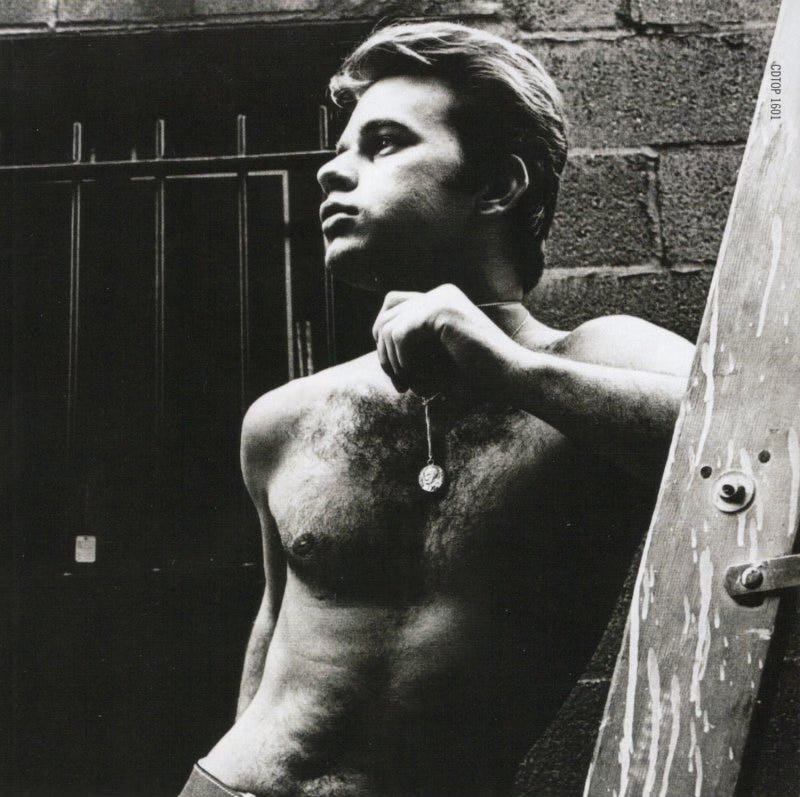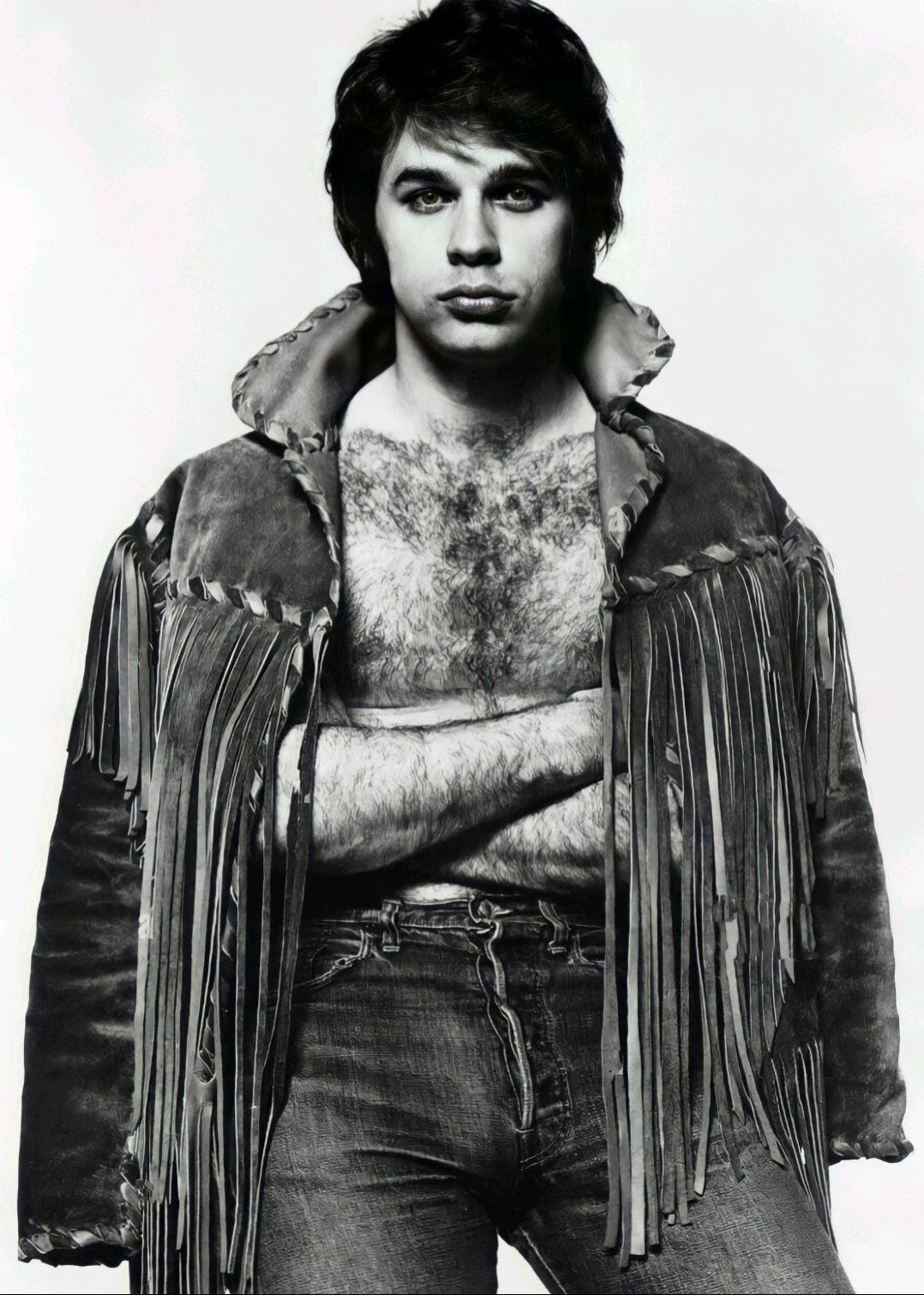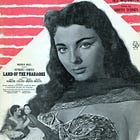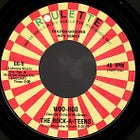Rhapsodies in the Rain
A dozen favorite slabs of falsetto fabulousness from the late, great Lou Christie
The Grim Reaper has been way too reap-y of late with my musical heroes. First Sly Stone, then Brian Wilson, and now Lou Christie — and all, coincidentally, at the age of 82. (Happily, Paul McCartney seems to have made it to his 83rd birthday unscathed.)
The man born Lugee Alfredo Giovanni Sacco may not have changed the course of pop music like Brian or Sly (or Paul) did, but he was a brilliant pop visionary nonetheless, and someone whose music has inspired, entertained, amused and fascinated me greatly ever since I first heard my Aunt Geri’s 45 of “The Gypsy Cried” back in ‘77 or so. Though it would be easy enough to lump him in with other Italian falsetto-slingers of the 1960s like Frankie Valli and Gene Pitney (whom I also love), there was far more to Lou Christie than his stratospheric upper vocal register.
For one thing, Lou had an incredibly pleasing and smooth tenor voice, and he probably could have enjoyed a very successful career as a straight-ahead crooner along the lines of Johnny Mathis if he’d simply concentrated on that part of his skill set. But “straight-ahead” wasn’t Lugee’s bag, baby — for him, it was all about the operatic elasticity of his four-octave vocal range, an elasticity which most of the many dozens of cinematic songs he wrote with Twyla Herbert (a mysterious Romany woman twenty years his senior) exploited for maximum dramatic effect.
For another, there was his flamboyant fashion sense: The man could rock a continental suit just as well as Pitney or the Four Seasons, but he seemed far more comfortable when draped in high-fashion mod vines (like the white trench coat on the cover of 1966’s Painter of Hits), poured into skintight leather and/or denim ensembles (see below), or simply wearing as little as possible (such as in the promo photo for his 1971 masterpiece Paint America Love).
And finally, there was Lou’s complex persona: by turns brooding, mysterious, witty, playful, soulful, cultured, romantic, musically adventurous, sexually-charged, and camp as the proverbial row of tents, he was so sensitive about his art that when Paint America Love flopped, he quit the music business altogether and spent several years working as [checks notes]… an offshore oil rigger, a truck driver and a carny. (It’s true!)
Comparisons to Scott Walker aren’t as off-base as they might initially seem, even if Scott contained a significantly lower mozzarella quotient and probably watched a lot more Bergman films. Both were gifted, highly intelligent dudes who were completely committed to blazing their own artistic trails, and whose incredibly personal musical visions still managed to translate at times into massive pop success.
Some JTL readers will already know all of this, of course. But for those of you that are unfamiliar with Lou, or only know a few of his hits, I highly recommend a making deep dig into his extensive and fascinating discography. Start with these twelve tracks (plus the “bonus cut” that he and Herbert co-wrote for girl group The Tammys), and go from there…
Guitars and Bongos
Much as I enjoy Lou’s early, doo-wop-flavored hits like “The Gypsy Cried” and “Two Faces Have I,” I far prefer the stuff where he felt free to get a little nuttier, like 1964’s “Guitars and Bongos”. Co-written with Herbert, presumably in an attempt to cash in on the Beach Party movies of the time, this song has plenty of guitars and bongos — along with bug-eyed falsetto shrieks so intense that they would have easily cleared Frankie, Annette and everyone else off their beach blankets in no time flat. (And if you can’t get enough of “Guitars and Bongos,” some sick fuck has actually put together a two-hour megamix of the song, which might be too much even for me.)
Lightnin’ Strikes
Lou’s lone Number One hit is also probably his quintessential single, filled to bursting as it is with dramatic music, conflicted lyrics, indelible hooks and acrobatic vocals that take off crazily into the ether every time he sees “lips dyin’ to be kissed” — and then come sweetly back to earth whenever he tries to justify his wandering eye to his long-suffering girlfriend. Big props to producer and arranger Charlie Calello for bringing all the elements together in one thrilling package; apparently, it was Capello’s idea to include the song’s rumbling guitar break (a pretty obvious precursor of Bruce Springsteen’s guitar solo in “Born to Run”) after he heard session man Ralph Casale goofing around in the studio with a six-string bass and a fuzz box.
Trapeze
“I gotta live fast, and you got what I need,” pants Lou on this 1965 album cut, which features another brilliant Charlie Calello production and would later show up on the flip of “Rhapsody in the Rain”. Unfortunately for him, the “swingin’ thing” he had going with his baby got messed up when some other guy sauntered into the picture. He claims to be “flying high” despite it all, but not even the song’s propulsive groove can camouflage his creeping acrophobia.
Rhapsody in the Rain
A note-perfect Christie-Herbert-penned and Calello-produced followup to “Lightnin’ Strikes,” 1966’s lusty — and Tchaikovsky-inspired! — “Rhapsody in the Rain” deserved a better fate than stalling out at #16, but the song’s success was sadly impeded by racy-for-the-time lyrics (“And in this car/Our love went much too far”) that kept many radio stations from playing it. Lou cut a more G-rated version at the label’s behest, but it came out too late to boost his ode to backseat romance any further up the charts. (No idea if that’s Ralph Casale again on the guitar solo, but you gotta love the way it calls back to Lou’s previous hit.)
If My Car Could Only Talk To Me
This completely bonkers 1966 masterpiece is one of those singles that I will always buy whenever I see it in the bin, just so I can give it to someone else who needs it in their life. (And, quite frankly, everyone needs it in their life!) Produced and arranged to maximum Spectorian effect by Jack Nitzsche, “If My Car…” sees Lou arriving home on leave from his Army stint, only to suspect that his beloved Sarah Jane has been learning “a new way of kissin’” (whatever that means!) in his Jaguar XKE during his absence. His suspicion ratchets up exponentially after he finds “pictures from the penny arcade — IN MY ASHTRAY-AY-A-AY-AY!” Even as glockenspiels ring out a warning in the pizza place parking lot, his car nobly refuses to divulge further details of any infidelities it may or may not have borne mute witness to, and the hysteria builds upon itself until finally Lou is moaning like a muted trumpet and Sarah Jane is begging him not to go… or at least not to revoke her XKE privileges.
Back to the Days of the Romans
I deeply love this bizarre 1967 track — which ended up on the B-side of two different singles — even if I’ve never known entirely what to make of it. On the one hand, Lou seems to be gallantly offering old-timey romance (“I’ll give you moon love!”) to the object of his affection, in order to show that he’s not like all the other guys in this decadent age. On the other, he sings “Back to the days of the Romans, baby/That’s where we’re goin’/That’s where we’re goin’!/Sing Hallelujah!” with all the gleeful falsetto brio of a man who is already oiling himself up for the next orgy. He contained multitudes, our Lugee…
Genesis and the Third Verse
Whoops — looks like somebody spiked Lou’s cappuccino with LSD! But that’s okay, because he’s come out of the trip with a renewed awareness of the Earth’s beauty and the need for humans to come together in order to prevent its destruction… and he’s got Twyla Herbert and Charlie Calello to help him shape his lysergically-stimulated thoughts on the matter into a four-minute pop-soul-psych-falsetto-gospel sermon. “But I’m just another man/Playing the part the best I can,” he muses. “So catch me if I fall/There’s something big within us all”. What does this all have to do with the third verse of Genesis, where God said “Let there be light”? Honestly, I’m still trying to figure that one out…
Canterbury Road
One of Lou’s most stirring non-falsetto vocal performances, this 1968 single finds him rewriting the words to “There is Nothing More to Say” by Curt Boettcher’s psych-pop project The Millennium, and further expounding upon his soulful vision of pastoral escape and brotherly love. The non-LP single’s instrumental flip side, the Twyla Herbert-composed “Saints of Aquarius,” would later reappear on Paint America Love as “Campus Rest”.
I’m Gonna Make You Mine
Psychedelically-tinged ecological reveries are nice, of course, but they don’t really pay the bills — and in 1969 Lou snapped back into pure pop mode with this international smash. Penned by Tony Romeo (who’d already written “Indian Lake” for The Cowsills and would go on to write “I Think I Love You” for The Partridge Family), produced and arranged by Stan Vincent (who was soon to write “Ooh Child” for The Five Stairsteps), and featuring backing vocals by Ellie Greenwich and Linda Scott, “I’m Gonna Make You Mine” seamlessly updates Lugee’s falsetto pop style for the bubblegum era. And then there’s the song’s promotional video, wherein he “delivers a package” to the local scrapyard…
She Sold Me Magic
A big hit in the UK and Japan, “She Sold Me Magic” is one of my favorite turn-of-the-decade Christie cuts. Penned by Lou and Twyla, and featuring a propulsive pop-soul arrangement from Stan Vincent, the two-minute nugget finds our hero mulling over the advances (“She says I’m in my better lifetime/She said my soul is matchin’ her sign”) of what Lance from Detectorists would call a “new age girl”. The video appears to have been shot the same day as his scrapyard visit, judging by Lugee’s threads, and has nothing whatsoever to do with the song — but hey, who doesn’t love random shots of him riding escalators, trying out a shoe polishing machine, and exchanging meaningful glances with some random guys over pints and a cup of tea?
Paint America Love
Released under the name Lou Christie Sacco (a tip-off that he was making a serious statement), 1971’s Paint America Love was kind of like a East Coast counterpart to the widescreen Americana concept album that Brian Wilson and Van Dyke Parks had attempted with The Beach Boys’ Smile, only less whimsical and more soulful. The epic closing title track is a plea for peace and brotherhood in the face of the era’s socio-political turbulence; and if lines like “Salt in our wounds/Loving communes” sound hopelessly dated, the song’s pre-chorus of “Time to paint America/Time to honor the best in ourselves/Time for hope/Time for peace/Paint it love/Paint it love” feels as relevant as ever these days.
Don’t Knock My Love (with Pia Zadora)
So, yeah — in 1980, Lou cut a ripping disco-funk duet on Wilson Pickett’s “Don’t Knock My Love” with no less than a pre-Butterfly Pia Zadora. As if you needed further evidence of just how fucking cool he was…
Bonus Track: Egyptian Shumba
Born and raised in the Pittsburgh metropolitan area, Lou discovered Oil City, PA-based girl group The Tammys (who were calling themselves The Impressions at the time) in 1961, while playing a local gig with his band Lugee and the Lions. Impressed by the girls’ vocal blend, he brought them in to sing backup for him on several of his early hits, and he helped the trio land a short-lived deal with United Artists. Lou and Herbert also co-wrote “Egyptian Shumba” for them, a song whose giddy charms (and immortal couplets like “Way down in Egypt land/The mummies took our hand”) have made it quite the cult favorite in subsequent decades, even though it stiffed upon its original release in 1963. For years, I theorized that “The Tammys” was actually a pseudonym for a multi-tracked, vari-speeded Lou Christie, and reckoned that he’d probably recorded “Egyptian Shumba” while wearing a bouffant wig and a pencil skirt. I know better now, of course, but I still enjoy my imaginary version of that recording session.
Did I ever see Lou Christie in concert? Yes, but only once, at a street fair in Palm Springs in the fall of 2003. He still looked great, was stylish as ever — resplendent in a banana yellow sport shirt with tailored black slacks and cuban-heeled boots — and was in phenomenal voice. He sang all his biggest hits (including the early “Ay Yi Yi songs,” as he jokingly referred to them), but his set also included an unexpected but really solid version of Tom Waits’ “(Looking for) The Heart of Saturday Night”.
He seemed to be having an absolute blast onstage, moving back and forth during the instrumental breaks with this weird but effortlessly smooth backwards boogaloo shuffle, and the crowd totally ate it up. In fact, I was standing near a couple of older, leather-skinned women who were getting audibly turned on by his act. “OHHH, THAT VOICE!” they kept moaning between long drags on their cigarettes, sounding exactly like Patty and Selma from The Simpsons fawning over MacGyver.
I was hoping to hear “If My Car Could Only Talk,” “Genesis and the Third Verse” or some other Lugee deep cut; I didn’t get them, but the man had something even more special planned for the show’s final number. “I’d like to dedicate this last song to all my fans who have stuck with me over the years,” he announced, before launching into the most heart-stoppingly beautiful version of The Association’s “Never My Love” I’ve ever heard, which was delivered like a torch song and festooned with gorgeous falsetto swoops.
By the song’s end, Lou was so wrapped up in it that he’d fallen to his knees, his head bowed to the audience in sincere gratitude and his body trembling with emotion and intensity. It was pure showmanship, on one level, but it was also delivered with what I can only describe as pure love, and I’ll never, ever forget it. B.J. Thomas was scheduled to perform right after him, but I just turned around and went home; short of setting himself on fire while eating a pastrami sandwich and singing “Eyes of a New York Woman,” there was no way B.J. could have ever topped what I’d just witnessed.
Thank you Lou for that memory, and for all the great music. In your immortal words, it was exciting, exciiiiiting… ooo wee, ooo wee baby!
You may also dig…







I was lucky to get to interview Lou in person for my podcast in 2023. Definitely worth a listen - absolutely fascinating conversation. https://lnk.to/BeMl1f
Great introduction to the magical world of Lou Christie. "I'll Make you Mine, reminds me of another song, but I can't place it. Did Manfred Mann cover it, or some other British Invasion band?